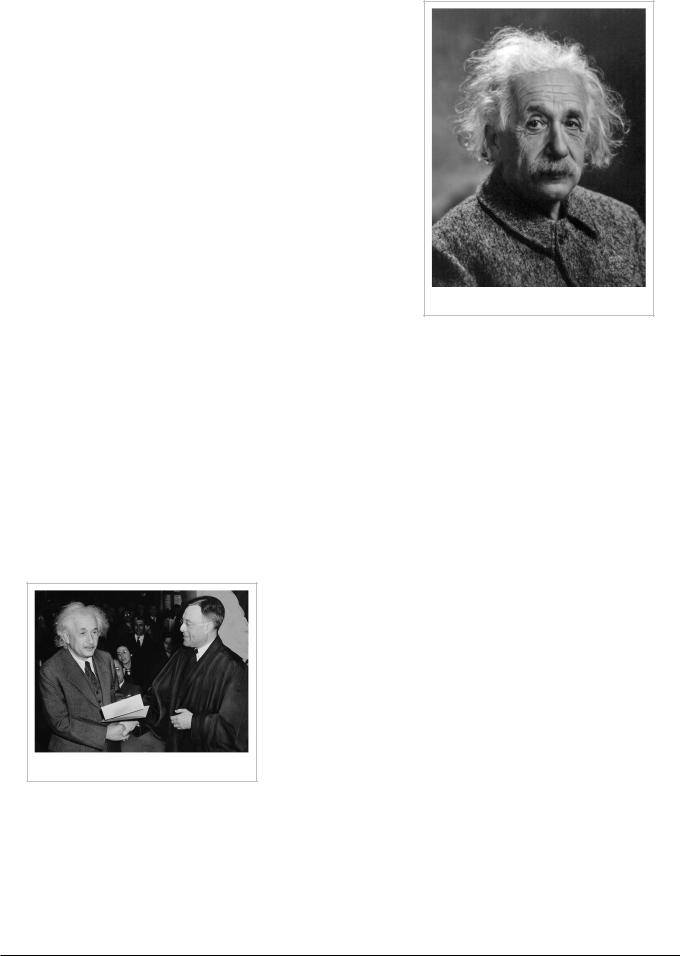
- •Albert Einstein
- •Biography
- •Early life and education
- •Marriages and children
- •Travels abroad
- •World War II and the Manhattan Project
- •U.S. citizenship
- •Death
- •Scientific career
- •1905 – Annus Mirabilis papers
- •Thermodynamic fluctuations and statistical physics
- •General principles
- •Theory of relativity and E = mc²
- •Photons and energy quanta
- •Quantized atomic vibrations
- •Adiabatic principle and action-angle variables
- •Wave–particle duality
- •Theory of critical opalescence
- •Zero-point energy
- •General relativity and the Equivalence Principle
- •Hole argument and Entwurf theory
- •Cosmology
- •Modern quantum theory
- •Bose–Einstein statistics
- •Energy momentum pseudotensor
- •Unified field theory
- •Wormholes
- •Einstein–Cartan theory
- •Equations of motion
- •Other investigations
- •Collaboration with other scientists
- •Einstein–de Haas experiment
- •Schrödinger gas model
- •Einstein refrigerator
- •Bohr versus Einstein
- •Einstein–Podolsky–Rosen paradox
- •Political and religious views
- •Love of music
- •Non-scientific legacy
- •In popular culture
- •Awards and honors
- •Publications
- •Notes
- •References
- •Further reading
- •External links
- •License

Albert Einstein |
8 |
World War II and the Manhattan Project
In 1939, a group of Hungarian scientists that included emigre physicist Leó Szilárd attempted to alert Washington of ongoing Nazi atomic bomb research. The group's warnings were discounted.[64] Einstein and Szilárd, along with other refugees such as Edward Teller and Eugene Wigner, "regarded it as their responsibility to alert Americans to the possibility that German scientists might win the race to build an atomic
bomb, and to warn that Hitler would be more than willing to resort to such a weapon."[53]:630[65] In the summer of 1939, a few months before
the beginning of World War II in Europe, Einstein was persuaded to lend his prestige by writing a letter with Szilárd to President Franklin D. Roosevelt to alert him of the possibility. The letter also recommended that the U.S. government pay attention to and become directly involved in uranium research and associated chain reaction research.
The letter is believed to be "arguably the key stimulus for the U.S.
adoption of serious investigations into nuclear weapons on the eve of
the U.S. entry into World War II".[66] President Roosevelt could not take the risk of allowing Hitler to possess atomic bombs first. As a result of Einstein's letter and his meetings with Roosevelt, the U.S. entered the "race" to develop the bomb, drawing on its "immense material, financial, and scientific resources" to initiate the Manhattan Project. It became the only country to successfully develop an atomic bomb during World War II.
For Einstein, "war was a disease . . . [and] he called for resistance to war." But in 1933, after Hitler assumed full
power in Germany, "he renounced pacifism altogether . . . In fact, he urged the Western powers to prepare themselves against another German onslaught."[67]:110 In 1954, a year before his death, Einstein said to his old
friend, Linus Pauling, "I made one great mistake in my life — when I signed the letter to President Roosevelt
recommending that atom bombs be made; but there was some justification — the danger that the Germans would make them..."[68]
U.S. citizenship
Einstein accepting U.S. citizenship, 1940
outworn traditions.[54]:432
Einstein became an American citizen in 1940. Not long after settling into his career at Princeton, he expressed his appreciation of the "meritocracy" in American culture when compared to Europe. According to Isaacson, he recognized the "right of individuals to say and think what they pleased", without social barriers, and as result, the individual was "encouraged" to be more creative, a trait he valued from his own early education. Einstein writes:
What makes the new arrival devoted to this country is the democratic trait among the people. No one humbles himself before another person or class. . . American youth has the good fortune not to have its outlook troubled by
As a member of the National Association for the Advancement of Colored People (NAACP) at Princeton who campaigned for the civil rights of African Americans, Einstein corresponded with civil rights activist W. E. B. Du
Bois, and in 1946 Einstein called racism America's "worst disease".[69] He later stated, "Race prejudice has unfortunately become an American tradition which is uncritically handed down from one generation to the next. The
